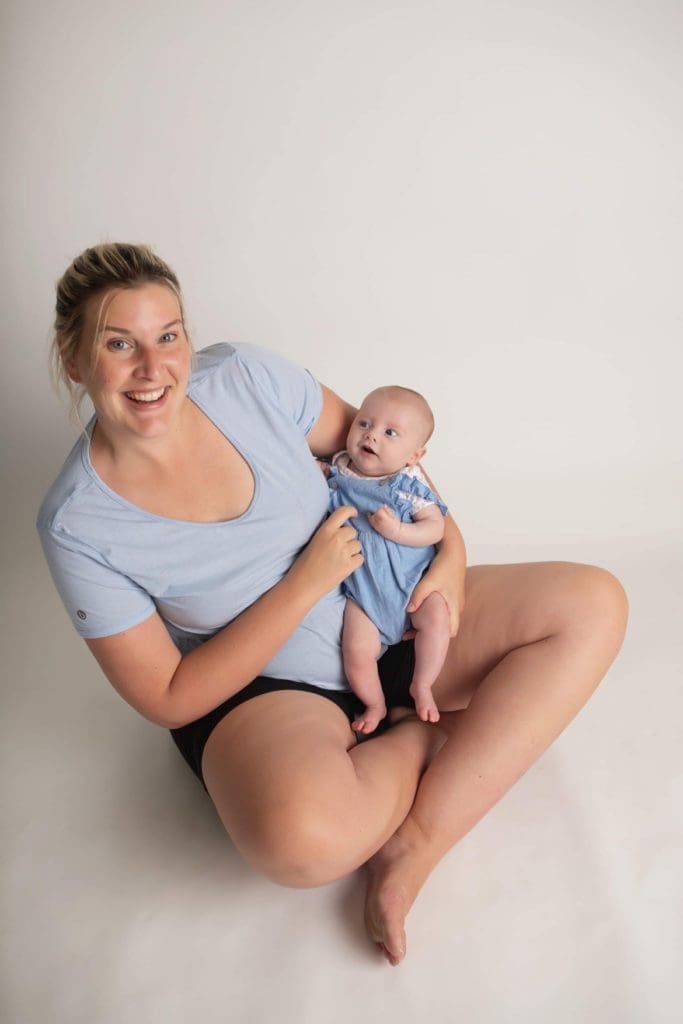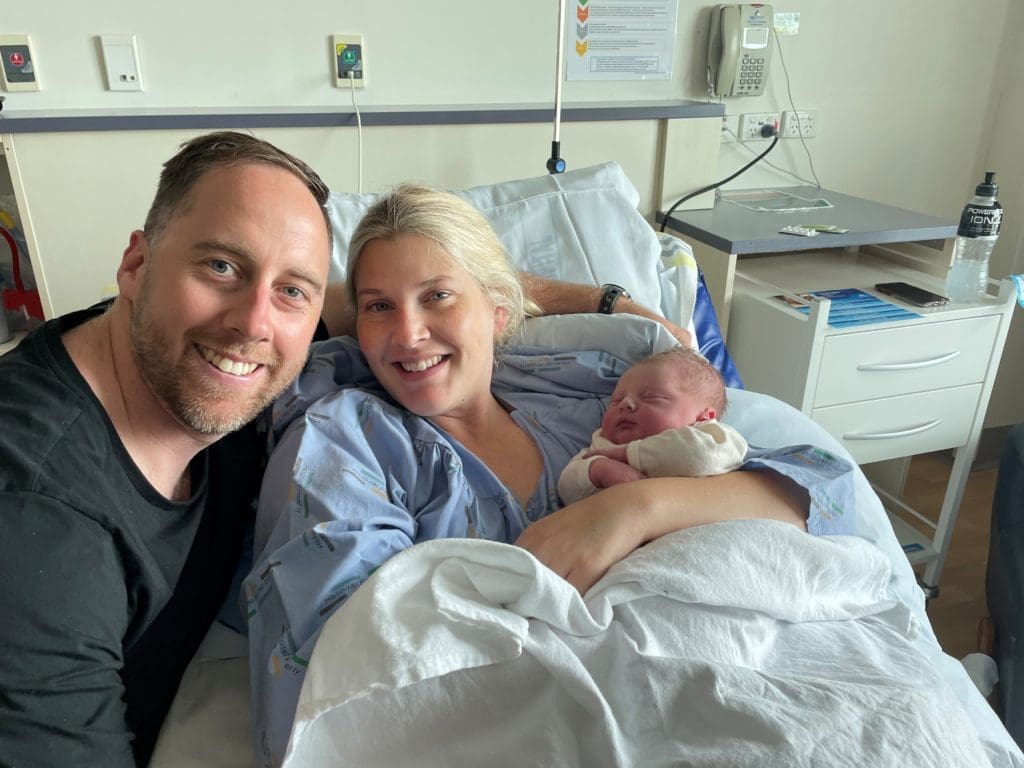Capsule x Fertility Associates
It’s Endometriosis Awareness Month, and while having Endo is awful enough at the best of times, when it comes to having a baby, it can be a whole other battle. We speak to a sufferer who battled the odds and managed to fulfil her dream of becoming a mother – but it did take a little help and a lot of determination.
When it was finally time for Samantha Wootten to give birth, after struggling for years with endometriosis and fertility, she had to laugh.
In full labour and experiencing contractions, Sam (31) realised that labour pains were less excruciating than the horrific endometriosis pain she endured almost daily.
“I can say, hand on heart and with full confidence now, that having a baby and endo pain are pretty comparable,” she says, shaking her head.
“When I actually went into labour with Scarlett, I didn’t realise it for a long time because I thought it was the endo – Scarlett was on top of my bowel which has a lot of scar tissue, so I was in pretty much constant pain throughout the last stages of my pregnancy. So, I didn’t make it to the hospital until I was about eight centimetres dilated.”
Sam’s journey to motherhood has been a long one, tinged with worry, anxiety, and pressure as she navigated life with severe endometriosis. Since being diagnosed when she was 16, the Auckland woman knew she’d potentially struggle to fall pregnant and was encouraged by her doctors to think about having children earlier, rather than later.
“I got my period around the same age as my friends, about 14, and instantly I noticed that they were using the little mini tampons, but I was already on the supers,” Sam remembers.
“And then when I was 16, I started getting really painful bowel movements, and when I was putting tampons in, there was a pain there.”
Sam headed off to the doctor, who performed a laparoscopy to check for endometriosis straight away, and it determined that it was all over her bowel and the opening of her vagina.
“Which explained why things like putting in tampons and going to the bathroom were so painful,” nods Sam.

“Endometriosis is a chronic inflammatory disease where patches of endometrium-like tissue grow outside the uterine cavity,” explains Dr Phill McChesney, a gynaecologist, obstetrician and fertility specialist at Fertility Associates,
“These patches or implants are hormone-dependent, changing in response to oestrogen and progesterone, as the endometrium does in the uterus. Associated with the endometrial tissue are new blood vessels, nerve growth and associated inflammation. And in the longer term, adhesions (scar tissue) may develop.”
Sam had her first laparoscopic surgery to remove as much endometriosis as possible – a procedure she’d eventually undergo three times to help keep the inflamed tissue at bay.
However as she got older, the pain got worse – especially when it was time to have sex.
“I started a relationship, and it was just an awful time in my life to be honest,” she tells. “I just wanted to navigate through things and be a normal teenager.”
Having her third and final surgery before heading off on her OE at 21, Sam’s doctor also tried to insert a Mirena, but Sam’s body ended up rejecting the implant, and she bled continuously for 10 months.
“Not the best for a single 21-year-old trying to live her best life overseas!” she laughs grimly. “I kind of battled through for a few years, and then I got to 27, and I went back to my doctor because I started bleeding all the time again. I was recently single and wanting to date, and I just couldn’t do anything – guys were just like, ‘Oh my God!’.”
Luckily for Sam, she met her now-husband Alastair who has been nothing but supportive of her struggle, and following doctor’s advice, the couple, who got married in 2019, decided to start trying for a baby pretty quickly.
However, as her earlier doctors predicated, Sam was among the third of endometriosis patients who struggle with fertility.
“The association between endometriosis and infertility is poorly understood,” says Dr McChesney. “While endometriosis does lower fertility, most women with endometriosis who try to conceive will get pregnant on their own. It’s estimated up to one-third of women with endometriosis will suffer from infertility.”
Sam went to see Fertility Associates after struggling for 12 months to fall pregnant, and was then diagnosed with Polycystic Ovary Syndrome as well.
“That happened when I came off the pill – the pill must have been keeping it at bay, because it was never detected in any of my other operations.”
“So that’s when I started to get scared – I was thinking that this might not happen for me. I’ve always wanted to be a mum, I was destined to be a mum,” she tells.
Sam embarked on two courses of Letrozol treatment with Fertility Associates, a type of oral ovulation induction. It works by encouraging the ovaries to ovulate by producing more natural stimulation – so you still have to have sex to get pregnant, but your ovaries are helped along on the way.
Sam’s first treatment was unsuccessful, but she fell pregnant on her second attempt – and now has her gorgeous four-month-old, Scarlett.
“She’s amazing – and God, how our life has changed!” says Sam. “She’s what I’ve wanted my whole life, and I know I have Fertility Associates to thank for that. And the amount of respect I have for women in general after going through all of this – I mean, we’re bloody amazing.”
While Sam has had a rough road with endometriosis, she admits she’s lucky in one area – being able to be diagnosed almost instantly.
“I know so many other women struggle to get a diagnosis,” she nods. “It must be the most frustrating thing on the planet.”
But why is it so hard to diagnose an illness that 10-15% of the childbearing population suffer from?
“Unfortunately, the majority of lower-grade endometriosis is not visible on ultrasound, but can still cause terrible pain and other symptoms,” explains Dr McChesney. “The diagnosis is still a surgical one for most, so can only be confirmed by surgery. It can also be missed at laparoscopy if the operating surgeon is not experienced with endometriosis. Doctors need to be mindful of endometriosis as a diagnosis and refer to the appropriate gynaecologist without unnecessary delay.”


Let’s be real – periods without endometriosis can be excruciating. So how can you tell if something else might be going on inside your body?
Pain is the most common symptom, especially excessive menstrual cramps that may be felt in the abdomen or lower back,” says Dr McChesney. “Needing to take days off work or school, for example, indicates the likelihood of endometriosis.
“The other symptoms women can look out for include mid-cycle pain (especially if occurring more often on the same side, or that still occurs when taking the combined oral contraceptive pill) or deep pain during sex. Some women also note bloating, fatigue, premenstrual spotting, pain moving bowels or an irritable or painful bladder.”
However, with awareness of the disease increasing every year, there is hope. Anecdotally, more women are being diagnosed than ever before – but is it because we’re more aware of the condition, or technology is improving?
“Both,” nods Dr McChesney. “Thankfully both women and doctors are becoming more aware of endometriosis, and consider the diagnosis more often. However, imaging techniques such as pelvic ultrasound and also laparoscopy have made advances.”
Says Sam, if you’re not sure, speak to your doctor – or head to Fertility Associates, who offer free nurse consultations.
“It would have been a lot harder to conceive Scarlett if I didn’t have all the information that I had,” she nods.
“It was a journey to get here, for sure – and I’m very keen to talk about it because endometriosis just doesn’t get discussed. Four or five of my friends have it, and if you don’t keep on top of it or if you’re not diagnosed, you can run into trouble. It’s the knowledge is power thing – just knowing what your lot is, and figuring out a way through.”
Fertility Associates offers free nurse consultations – click here for more information


